Kenneth C. Davis's Blog, page 94
July 26, 2013
Don’t Know Much About Executive Order 9981
On July 26, 1948, President Harry S. Truman issued an Executive Order that ended official discrimination in the United States military.
[image error]
After Truman’s order. the U.S. military was desegregated and integrated units fought in Korea. (Photo: U.S. Army-November 1950)
It is hereby declared to be the policy of the President that there shall be equality of treatment and opportunity for all persons in the armed services without regard to race, color, religion or national origin. This policy shall be put into effect as rapidly as possible, having due regard to the time required to effectuate any necessary changes without impairing efficiency or morale.
Coming in an election year, it was a daring move by Truman, who still needed the support of southern segregationists. It was also a controversial decision that led to the forced retirement of the Secretary of the Army when he refused to desegregate the Army.
As historical documents go, “Executive Order 9981″ doesn’t have quite the same ring as “Emancipation Proclamation” or “New Deal.” But when President Harry S. Truman issued this Executive Order, he helped transform the country. This order began the gradual official process of desegregating America’s armed forces, which was a groundbreaking step for the American civil rights movement. (It is worth noting that many of the arguments made at the time against integration of the armed services –unit cohesion, morale of the troops, discipline in the ranks– were also made about the question of homosexuals serving in the military, a policy effectively ended when “Don’t Ask, Don’t Tell” was overturned in 2011.)
In a Defense Department history of the integration of the Armed Forces, Brigadier General James Collins Jr. wrote in 1980:
The integration of the armed forces was a momentous event in our military and national history…. The experiences in World War II and the postwar pressures generated by the civil rights movement compelled all the services –Army, Navy, Air Force, and Marine Corps — to reexamine their traditional practices of segregation. While there were differences in the ways that the services moved toward integration, all were subject to the same demands, fears, and prejudices and had the same need to use their resources in a more rational and economical way. All of them reached the same conclusion: traditional attitudes toward minorities must give way to democratic concepts of civil rights.
Here is the text of the Executive Order 9981 (dated July 26, 1948)
A Chronology of events leading to the Order and more information can be found at the the Truman Library.
You can learn more about Truman in Don’t Know Much About® the American Presidents and more about the Cold War and Korean War in Don’t Know Much About® History.
[image error]
Don’t Know Much About History (Anniversary Edition, paperback)

Don’t Know Much About the American Presidents
(Hyperion Books/September 18)
July 23, 2013
Who Said It (7/23/13)
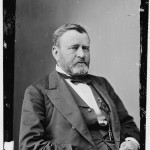
Ulysses S. Grant, 18th President of the U.S. (Source: Library of Congress)
President Ulysses S, Grant, Speech to veterans of the Army of Tennessee (September 30, 1875)
“Resolve that neither the State nor the nation shall support institutions of learning other than those sufficient to afford every child the opportunity of a good common-school education, unmixed with sectarian, pagan, or atheistic dogmas. Leave the matter of religion to the family altar, the church, and the private school supported entirely by private contribution. Keep the church and state forever separate.”
(Source: Jean Edward Smith, Grant, p. 570)
At a time when the debate over public support for sectarian education and religious exercises in public schools was being hotly contested, President Grant waded into the subject. At the time it was largely a Catholic-Protestant dispute, as many American Catholics were trying to battle the overtly Protestant tone of public school education.
Grant’s views were remarkable at the time, as Grant biographer Jean Edward Smith wrote:
The President’s demand for the separation of church and state took the wind from militant Protestants advocating a pro-religion amendment to the Constitution.
(Grant, p. 570)
Ulysses S. Grant died on July 23, 1885. His New York Times obituary appeared on July 24, 1885. At the time of his death, Grant was one of the most admired men in American and when he was later entombed in New York City, more than one million people lined the streets to view the passing of his body.
You can read more about Grant’s life and Presidency in Don’t Know Much About the American Presidents, Don’t Know Much About History and Don’t Know Much About the Civil War.
[image error]
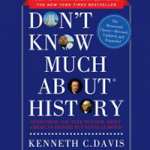
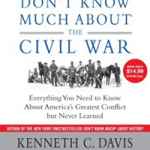
July 17, 2013
Who Said It (7-17-2013)
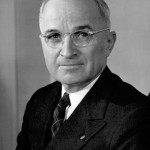
President Harry S. Truman
(Photo: Truman Library)
President Harry S. Truman (Diary Entry July 17, 1945)
“Promptly a few minutes before twelve I looked up from the desk and there stood Stalin in the doorway. I got to my feet and advanced to meet him. He put out his hand and smiled. I did the same. . . . After the usual polite remarks we got down to business. I told Stalin that I am no diplomat but usually said yes or no to questions after hearing all the argument. It pleased him. I asked him if he had the agenda for the meeting. He said he had and that he had some more questions to present. I told him to fire away. He did and it is dynamite—but I have some dynamite too which I’m not exploding now. . . . I can deal with Stalin. He is honest—but smart as hell.”
(Source: The National Archives)
“On July 17, 1945, two months after Germany surrendered to the Allies at the end of World War II, President Harry S. Truman came face to face with Marshal Joseph Stalin of the Soviet Union, one of the most brutal autocrats of all time.
The meeting between Truman and Stalin took place in a suburb of the devastated city of Berlin just before the opening of the Potsdam Conference. Truman, Stalin, and Great Britain’s Prime Minister Winston Churchill, leaders of the three largest Allied nations, were gathered there to discuss the political future of Europe and the conduct of the war still raging in the Pacific.” (Eyewitness: The National Archives)
Read more about Truman at Potsdam at PBS American Experience
And I discuss Truman’s presidency in greater detail in Don’t Know Much About the American Presidents and the post-World War II beginnings of the Cold War in Don’t Know Much About History.

Don’t Know Much About History (Revised, Expanded and Updated Edition)
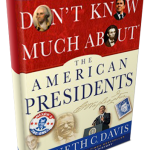
July 10, 2013
“The Will Of the People?” Or the “Tyranny of the Majority?”
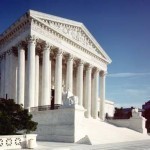
The Supreme Court of the United States (Source: Supreme Court)
That didn’t take long. In the wake of the Supreme Court decisions in a pair of marriage equality cases on June 26 comes word that the American Civil Liberties Union will challenge Pennsylvania’s ban on same-sex marriages.
That idea roils opponents of gay-marriage who say “using the courts undermines the will of the voters.” That view echoes the opinion of New Jersey Governor Chris Christie, who called the Supreme Court DOMA ruling “insulting,” repeated a vow to veto same sex marriage legislation in his state, and restated his belief that this decision should be left to the voters through a ballot referendum.
So in a democracy like ours, who decides? Is it a “Government of the people, by the people, and for the people” as Lincoln said in the Gettysburg Address?
The problem is we’ve “been there, done that” as a nation —leaving the people to decide a weighty moral and legal issue –with decidedly mixed results.
The concept that the people are the source of power is known as “Popular Sovereignty,” an Enlightenment-era political theory that held that government is created through the will of the people. As Jefferson put it in the Declaration, governments “derive their just powers from the consent of the governed.” It is an idea cemented in the first three words of the Constitution, “We the People.”
But “popular sovereignty” acquired a new meaning in the 19th century, when many American politicians believed that letting the people decide the fate of slavery was the tidy answer to the nation’s most contentious issue.
The question at the time was not whether to completely abolish slavery, but the narrower issue of allowing slavery to move west into new territories being opened in the mid-19th century.
For decades, this question had dominated political debate and increasingly split the country. That fracture deepened violently with the Kansas-Nebraska Act of 1854, the handiwork of Senators Stephen Douglas and Lewis Cass. Under its terms, the residents of these territories would decide whether the territory would gain admission to the Union as a free or slave state.
On its face, “popular sovereignty” appears to be the most democratic of solutions. But allowing the people of the territories to make such a decision had profound political implications, as slaves were still to be counted for the purpose of determining representation in Congress and the number of presidential electors that each new state would receive -–the “three-fifths of a person” Constitutional compromise. (Slaves, of course, were still “property” and had no vote or other rights.)
As a middle-way compromise, popular sovereignty ultimately led anti-slavery forces to coalesce into the Republican Party and extension of slavery would be central in the famed debates between Stephen Douglas and Lincoln in 1858.
But more tragically, popular sovereignty set off a frenzied dash to settle Kansas by supporters of the free and slave positions. This headlong rush led to the murderous conflict known as “Bleeding Kansas” that began in 1856, the true opening salvo of America’s fraternal war. Instead of resolving the question of extending slavery, popular sovereignty hastened the road to the firing on Fort Sumter and the onset of the Civil War in April 1861.
This History and Civics 101 lesson underscores the problem with the seemingly obvious solution of letting the people decide questions so momentous. And it is at the heart of why America has a representative and republican form of government instead of a pure democracy. “Majority rule” may work perfectly for picking the senior class president, making decisions about a school budget at town meeting –or even choosing a governor. But the Framers of the Constitution, in their wisdom –and their deep skepticism of the “people”— did not want to leave some important decisions to a democratic resolution. To many of them, the people were ill suited to make weighty choices and to many of them, democracy was one short step from mob rule and anarchy.
And that is the chief reason we have an Electoral College. It is also the reason that the Framers left the election of senators to the state legislatures (until the ratification of the 17th Amendment providing for direct election of senators in 1913). And it is why they set such a high bar for amending the Constitution.
But here’s the other side of the balance. Pure democracy has also been viewed as a threat to individual rights, a fear voiced by Founding Father John Adams who had written in 1774 of a “government of laws and not of men.” Adams also warned against what he called the “tyranny of the majority.” That phrase would later be echoed by Alexis de Tocqueville in his classic 1835 treatise Democracy in America, in which he wrote two decades before Kansas turned bloody,
“If ever freedom is lost in America, that will be due to the omnipotence of the majority driving the minorities to desperation and forcing them to appeal to physical force.”
Adams and de Tocqueville both recognized the fact that the majority will is not always right or just – a point proven many times over in American history on questions of immigration, suffrage, religion, and civil rights. Can there be any doubt that many of the great strides made in individual rights in this country would have come about much more slowly if left to “popular sovereignty?” Or that the end to segregation would have played out differently if dependent upon the “will of the people?”
It was only fifty years ago, that another popular, outspoken and fiery governor said,
“Segregation now. Segregation tomorrow. Segregation forever.”
George Wallace’s words were surely popular with the white majority in Alabama that had elected him in a landslide in 1962. And many of the people of his state might well have agreed –if the question were put to a referendum.
But as the nation continues to debate the fundamental right to marry in the wake of these Court rulings, which will carry the day? “Popular Sovereignty” and with it the possible “Tyranny of Majority?” Or an inalienable right to “life, liberty and the pursuit of happiness” which includes marrying the person of your choice?
[image error]

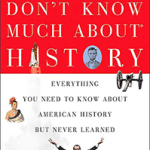
July 9, 2013
Who Said It? 7/9/13
President John Quincy Adams “Inaugural Address” (March 4, 1825)
Our political creed is, without a dissenting voice that can be heard, that the will of the people is the source and the happiness of the people the end of all legitimate government upon earth; that the best security for the beneficence and the best guaranty against the abuse of power consists in the freedom, the purity, and the frequency of popular elections; that the General Government of the Union and the separate governments of the States are all sovereignties of limited powers, fellow-servants of the same masters, uncontrolled within their respective spheres, uncontrollable by encroachments upon each other; that the firmest security of peace is the preparation during peace of the defenses of war; that a rigorous economy and accountability of public expenditures should guard against the aggravation and alleviate when possible the burden of taxation; that the military should be kept in strict subordination to the civil power; that the freedom of the press and of religious opinion should be inviolate; that the policy of our country is peace and the ark of our salvation union are articles of faith upon which we are all now agreed. If there have been those who doubted whether a confederated representative democracy were a government competent to the wise and orderly management of the common concerns of a mighty nation, those doubts have been dispelled; if there have been projects of partial confederacies to be erected upon the ruins of the Union, they have been scattered to the winds; if there have been dangerous attachments to one foreign nation and antipathies against another, they have been extinguished. Ten years of peace, at home and abroad, have assuaged the animosities of political contention and blended into harmony the most discordant elements of public opinion.
(Source: Miller Center-University of Virginia)
The 6th President, John Quincy Adams, was born on July 11, 1767. He was the son of the 2nd President, John Adams, and Abigail Adams.
Adams served as Secretary of State for eight years under James Monroe, a period known as the “Era of Good Will.” But the election of 1824 was bitterly contested, and ended up in the House of Representatives, which selected Adams over Andrew Jackson in what was called the “corrupt bargain” by Jackson and his supporters.
Find out more about John Quincy Adams, his administration and subsequent loss to Jackson, followed by his election to the House of Representatives in Don’t Know Much About the American Presidents. (Adams is the only former President to serve in the House after his term.)
[image error]
Don’t Know Much About the American Presidents
(September 18, 2012-Hyperion Books)
July 1, 2013
Who Said it? (7/2/13)
John Adams in a letter to Abigail Adams (July 3 1776)
But the Day is past. The Second Day of July 1776, will be the most memorable Epocha, in the History of America….It ought to be solemnized with Pomp and Parade, with Shews, Games, Sports, Guns, Bells, Bonfires and Illuminations from one End of this Continent to the other from this Time forward forever more.
(Source: Massachusetts Historical Society- Adams Electronic Archive)
On July 2, 1776, the Second Continental Congress had passed a resolution of independence for America. The next day, Adams wrote to his wife expressing his optimistic view that the date would go down in history and be cause for great celbrart5ion.
He was off by two days. After considerable debate, Congress adopted Thomas Jefferson’s Declaration of Independence and July 4th was quickly established in the American imagination as “Independence Day.”
[image error]
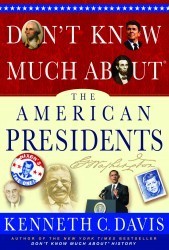
Don’t Know Much About® the American Presidents-now available in hardcover and eBook and audiobook
June 24, 2013
Who Said It? 6-24-13
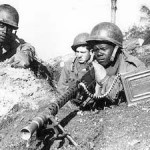
In the Korean War, the U.S. military was integrated. (Source: Library of Congress)
President Harry S. Truman, ordering U.S. forces into the Korean conflict to repel a North Korean invasion of South Korea (June 27, 1950)
In Korea the Government forces, which were armed to prevent border raids and to preserve internal security, were attacked by invading forces from North Korea. The Security Council of the United Nations called upon the invading troops to cease hostilities and to withdraw to the Thirty-eighth Parallel. This they have not done, but on the contrary have pressed the attack. The Security Council called upon all members of the United Nations to render every assistance to the United Nations in the execution of this resolution.
In these circumstances I have ordered United States air and sea forces to give the Korean Government troops cover and support.
The attack upon Korea makes it plain beyond all doubt that communism has passed beyond the use of subversion to conquer independent nations and will now use armed invasion and war.
(Source: New York Times. June 27, 1950)
Read more about the Cold War and Truman’s presidency in Don’t Know Much About® History and Don’t Know Much About® the American Presidents.
Find more at the Harry S.Truman Library & Museum.
[image error]
Don’t Know Much About the American Presidents
(September 18, 2012-Hyperion Books)

Don’t Know Much About History (Revised, Expanded and Updated Edition)
June 18, 2013
Juneteenth- How do you celebrate?
[image error]
`
The official Juneteenth Committee in East Woods Park, Austin, Texas on June 19, 1900. (Courtesy Austin History Center, Austin Public Library)
Happy Juneteenth! Since 1865, June 19th has served as another kind of Independence Day. It is a day that celebrates the end of slavery in America.
On June 19, 1865, Union General Gordon Granger informed former slaves in the area from the Gulf of Mexico to Galveston, Texas that they were free. Abraham Lincoln had officially issued the Emancipation Proclamation on January 1, 1863, but it had taken two more years of Union victories to end the war in April 1865 and for this news to reach enslaved people in remote sections of the country.
This is from General Granger’s Order No. 3:
The people of Texas are informed that, in accordance with a proclamation from the Executive of the United States, all slaves are free. This involves an absolute equality of personal rights and rights of property between former masters and slaves, and the connection heretofore existing between them becomes that between employer and hired labor. The freedmen are advised to remain quietly at their present homes and work for wages. They are informed that they will not be allowed to collect at military posts and that they will not be supported in idleness either there or elsewhere.
Many of the newly freed slaves in the territory, the last area to receive news of the war’s end and Emancipation, celebrated the news with ecstasy, and according to the Texas State Library, the words “June” and “nineteenth” became a new word and a new celebration of freedom. They called it Juneteenth.
In many parts of Texas, ex-slaves purchased land, or “emancipation grounds,” for the Juneteenth gathering. Examples include: Emancipation Park in Houston, purchased in 1872; what is now Booker T. Washington Park in Mexia; and Emancipation park in East Austin.
Other former slaves began to travel to other states in search of family members who had been separated from them by slave sales. Starting in 1866, that spontaneous celebration –more commonly called “Juneteenth”– spread to become a holiday celebrating emancipation in many parts of the United States, although it still lacks national recognition. Read more about Juneteenth in the article Juneteenth: Our Other Independence Day , which I wrote for Smithsonian.com
And read more about Civil War history in Don’t Know Much About the Civil War.

The paperback edition had been released with a new cover to mark the 150th anniversary of the Civil war.
Who Said It? 6-18-13
President James Madison in a Special Message to Congress (June 1, 1812)
The practice, hence, is so far from affecting British subjects alone that, under the pretext of searching for these, thousands of American citizens, under the safeguard of public law and of their national flag, have been torn from their country and from everything dear to them; have been dragged on board ships of war of a foreign nation and exposed, under the severities of their discipline, to be exiled to the most distant and deadly climes, to risk their lives in the battles of their oppressors, and to be the melancholy instruments of taking away those of their own brethren.
(Source: Miller Center-University of Virginia)
Congress voted in favor of a declaration of war on June 18, 1812, America’s first declared war.. The following day, President Madison issued a Proclamation of a State of War.
Read more about the Presidency of James Madison in Don’t Know Much About the American Presidents and the War of 1812 in Don’t Know Much About History.
[image error]

Don’t Know Much About History (Revised, Expanded and Updated Edition)
June 13, 2013
Don’t Know Much About the Lovings

The Loving Story Photo by Gray Villet (Source: HBO)
As the nation awaits the Supreme Court’s ruling in two cases related to marriage equality, it is worth revisiting the facts in the case of Loving v Virginia –decided by the Supreme Court on June 12, 1967. The case involved the law in Virginia, and other states, which prohibited interracial marriage, or “miscegenation.”
Loving v. Virginia changed that. And America.
On June 12, 1967, the Court issued its ruling in this case, striking down state laws prohibiting interracial marriage in America.
Richard Loving, a white man, married Mildred, a 18-year-old woman of African-American and Native American descent, in Washington, D.C. When they returned to their native Virginia, they were arrested in the middle of the night and the Lovings were forced to leave Virginia. A few years later, young Mildred asked Robert F. Kennedy, the new Attorney General, for help. He suggested the American Civil Liberties Union and she wrote to them. Two young lawyers decided to take the case. They brought suit which eventually found its way to the Supreme Court
The Court ruled that that anti-miscegenation laws, such as those in Virginia, violated the “Due Process Clause” (“No person shall be … deprived of life, liberty, or property, without due process of law….” ) and the Equal Protection Clause of the Fourteenth Amendment (“nor shall any State deprive any person of life, liberty, or property, without due process of law …”). In the unanimous majority opinion, Chief Justice Earl Warren wrote:
“Marriage is one of the ‘basic civil rights of man,’ fundamental to our very existence and survival.”
The Loving case is clearly part of the arguments that were made before the Supreme Court in a pair of cases in March 2013. (Since those arguments same sex marriage has been approved in Delaware and Minnesota, making same sex marriage legal in 12 states and the District of Columbia.)
Change in American history is often slow. And it usually comes from the bottom up –not the top down. Whether it was abolition, civil rights, or even independence itself, when it comes to most of the great social upheavals of our past, the politicians and “leaders” have generally had to be dragged kicking and screaming in the direction of change. It may be glacially slow, but it will happen, in part because there is a generational change that will someday make the existing same sex marriage prohibitions on the books seem as antiquated –and despicable—as the now-unconstitutional bans on interracial marriage.
Before her death in 2008, Mildred Loving, the woman of African-American and Native American descent who brought the suit against Virginia, issued a statement on the 40th anniversary of the decision. She wrote:
“Surrounded as I am now by wonderful children and grandchildren, not a day goes by that I don’t think of Richard and our love, our right to marry, and how much it meant to me to have that freedom to marry the person precious to me, even if others thought he was the ‘wrong kind of person’ for me to marry. I believe all Americans, no matter their race, no matter their sex, no matter their sexual orientation, should have that same freedom to marry. Government has no business imposing some people’s religious beliefs over others. I am still not a political person, but I am proud that Richard’s and my name is on a court case that can help reinforce the love, the commitment, the fairness, and the family that so many people, black or white, young or old, gay or straight seek in life. I support the freedom to marry for all. That’s what Loving, and loving, are all about.”
I can’t say it any better than that.
The January/February 2012 issue of Humanities magazine featured the Lovings as did a recent HBO documentary, The Loving Story.
There is a more complete discussion of the history of the Lovings, their case and its connection to the same sex marriage debate in the new, revised edition of Don’t Know Much About History: Anniversary Edition.



